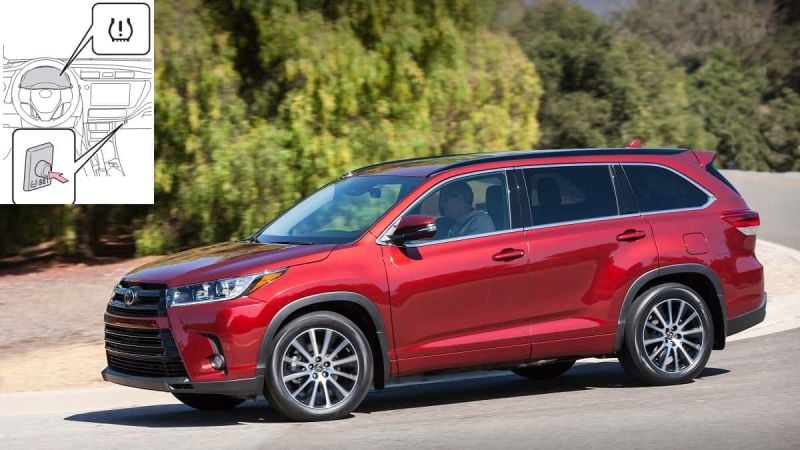Tire pressure monitoring systems are mandated by law in America. This is not a feature that Toyota installs as a feature on just some Highlander trims. For more than a decade, Toyota has been installing systems and they have been driving some Highlander owners crazy. While they certainly do help let you know if a tire is deflated, in many cases, these systems can be an annoyance.
Here are the reasons that your Toyota Highlander has a “Tire Pressure Warning System” alert as Toyota calls it. We will refer to it as “TPWS” from here forward. Before we begin, if your TPWS system warning light is on now, immediately check your tire pressure. Some cars can display the tire pressure in the information display. If yours doesn’t, use a tire pressure gauge to check the pressures. The correct setpoints for your Highlander are listed on the driver’s door. Do not drive your Highlander with the TPWS light on without verifying that the tires have proper air pressure.
Related: Where Is the Toyota Tire Pressure Monitoring System Reset Button Hidden?
Highlander Tire Pressure Warning - Temperatures Have Dropped
If seasonal temperatures are dropping and your TPWS warning light is illuminated, the reason is most likely due to the temperature difference between when the pressure was last set and the current temperatures. The pressure inside a tire drops with temperature. You need to reset the tire pressure in early winter and early summer. The air didn’t leak out of the tire. It simply became lower in pressure as the temperatures declined. This happens to all tires, in all vehicles, regardless of what gas is inside of them (air or nitrogen).
If you find that the pressure inside all of your tires is lower than the setpoint, top them off to the correct pressure. The TPWS light should go out shortly after you set the pressures to the proper level. If just one tire is lower than the rest by more than 25%, have a tire technician investigate.

Highlander Tire Pressure Warning - You Have a Flat Or More Than One Flat
The reason you have a tire pressure monitoring system in your Highlander is to detect a flat tire. Or more than one flat tire. If the light comes on while you are driving, this is the likely cause of it. Pull off the road to a safe area as quickly as you safely can and investigate. A visual inspection is not enough. Use your tire gauge to check the pressure in all four tires. If you have a flat, refer to the Highlander’s owner’s manual (see below) on what to do.
Highlander Tire Pressure Warning - TPWS System Failure
Our initial reaction when a warning light comes on is to hope it is wrong. They are sometimes. The TPWS system in your Highlander may have a problem, but it is unlikely. Yes, every person who has a problem with the tire pressure system in any car quickly goes to every Facebook forum to report it (angrily). However, the Toyota Highlander is not a vehicle that struggles with the TPWS system more so than others.
If you have verified the pressure in your tires is correct using a tire gauge, and the TPWS system is displaying a warning, ask a mechanic for help. You don’t have to go to a Toyota dealer, but if your Highlander is under the initial new vehicle warranty, that would certainly make sense.
Like any system in your Highlander, age and damage can cause a problem with the TPWS system. Individual sensors can be replaced, but the system will still need to be re-initialized. We suggest that this job is best done by a mechanic or tire professional who understands the system and can handle the work, but you can have go at it with the manual.
Related: How To Check and Maintain the Spare Tire In Your Toyota Highlander Before It’s Too Late
Highlander Tire Pressure Warning - Tire Sealants
Emergency tire sealants in a can like Fix-A -Flat, or Slime may cause your TPWS sensor to malfunction. This does not mean that the sensor is now destroyed. Here is what the Fix-A-Flat brand says about TPMS systems and its product: “Fix-a-Flat is tire sensor safe. After the qualified tire repair professional has repaired your tire, they should clean the TPMS device with water to remove any sealant that may have come into contact with the device. After the repaired tire is replaced and inflated, the TPMS system can be reset and will resume operating as normal.”
Prius Tire Pressure Warning - New Tire Or New Tires
If you buy new tires for your Highlander and immediately get a tire pressure warning light check the pressure. Mistakes happen. Flats sometimes happen driving out of a tire shop parking lot. If you have checked the pressure and it is properly set, return to the tire shop and let them know that the Highlander’s TPWS system has indicated a problem. If the shop changed the valve stems the system may need to be re-initialized.
Be aware that some TPWS systems are sensitive to tire sizes. You should only use the exact size of tire your Highlander came with. If you have mounted aftermarket wheels or a different size tire, the retailer who did the work should be able to explain to you how they will resolve the TPWS system.
Highlander Tire Pressure Warning - Nitrogen Is Unnecessary
There are some dealers and shops that will suggest nitrogen as a solution to a TPWS problem in a Highlander. The claims that advocates of nitrogen for tires make are unfounded by science (the author’s degree is in mechanical engineering, ask the nitrogen seller what his technical degree is).
Furthermore, your Toyota Highlander was designed to work perfectly fine using compressed air. And it should. Does inflating an underinflated tire with nitrogen cause the TPWS light to go out? Of course, it could. Just as inflating the tire with air will do. If you wish to waste money on nitrogen, that is your call. Just know that the Highlander doesn’t need it.
A TPWS system alert is always an annoyance, but for the most part, it is a feature that is there to help us in case a dangerous situation develops. Add air to your Highlander’s tires when temperatures begin to drop in early winter. Reset it again in early summer. These are the best two habits you can have to avoid TPWS issues.
Resources:
Find Your Highlander's Owner's Manual Here.
Highlander Tire Pressure Frequently Asked Questions:
Q: Where is the Tire Pressure Warning Switch reset button on a Highlander?
-A: On some generations, it is under the steering wheel (See top of page image). Follow the instructions in the manual to reset it.
Q: How do you reset the TPMS light on a Highlander?
-A: Use the owner's manual link at the bottom of the story to find your Highlander’s year and instructions. Follow them, but be aware that resting the system may not solve the underlying issue.
Q: Can the TPMS be in the Highlander turned off?
-A: The TPWS system cannot be turned off. It can be reset.
Q: Is it dangerous to drive with the tire pressure light on?
-A: Yes, driving without knowing why the light is on is dangerous until you have checked the pressure with a tire pressure gauge to verify that the pressures are correctly set.
John Goreham is a long-time New England Motor Press Association member and recovering engineer. Following his engineering program, John also completed a marketing program at Northeastern University and worked with automotive component manufacturers. In addition to Torque News, John's work has appeared in print in dozens of American newspapers and he provides reviews to many vehicle shopping sites. You can follow John on Twitter, and view his credentials at Linkedin
Hover mouse over image to see photo credits
Set as google preferred source












Comments
My 2016 Highlander Hybrid has
Permalink
My 2016 Highlander Hybrid has a tire pressure display. It lists 5 tires each with their own PSI. My qt. is which line or position in the list goes with which tire? Currently the first on the list has a problem so which tire is it? I did check all except the spare. They were good.
The first one on my 08
Permalink
In reply to My 2016 Highlander Hybrid has by Irene Watson (not verified)
The first one on my 08 highlander is the spare.